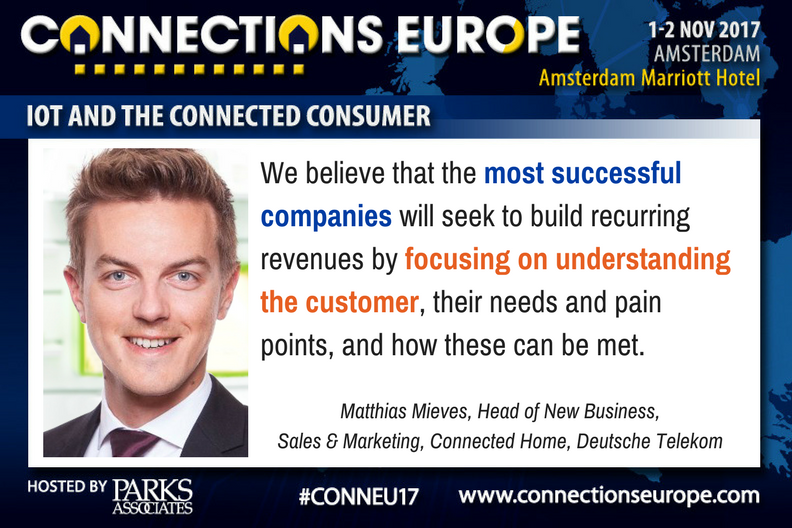 Prior to his keynote at the 12th-annual CONNECTIONS™ Europe conference in November, Matthias Mieves, Head of New Business, Sales & Marketing Connected Home at Deutsche Telekom, provided perspective on the growth of smart home and IoT markets in Europe.
Prior to his keynote at the 12th-annual CONNECTIONS™ Europe conference in November, Matthias Mieves, Head of New Business, Sales & Marketing Connected Home at Deutsche Telekom, provided perspective on the growth of smart home and IoT markets in Europe.
Matthias will present the keynote “Bringing Smart Home to Mass Market” on 1 November at 9:30. For more information on CONNECTIONS™ Europe, visit www.connectionseurope.com.
What are the largest recurring revenue opportunities for the smart home industry in Europe?
There is a myriad of business and revenue opportunities in the smart home sector as the move from merely selling hardware to creating service-based portfolios grows. This is an underpinning theme for all players, and the launch of services for the connected home rather than traditional product-based retailing is clearly a major plank of future success.
We believe that the most successful companies will seek to build recurring revenues by focusing on understanding the customer, their needs and pain points, and how these can be met. To date, the smart home market has too often been focused on technology for technology's sake and has overlooked the customer and their needs.
There will also be a greater willingness to partner to realize growth. Many smart home companies will thrive via collaboration, especially as there are not yet the industry-wide platforms or consistent standards.
Companies will succeed by introducing new and flexible business models. Flexibility of the model and the payment structure will be critical to gain the broadest appeal, and all with the aim of providing consumers with greater levels of peace of mind, convenience, and flexibility.
What are the biggest challenges rolling out new smart home products and services in Europe?
There are significant challenges facing the smart home market, and perhaps one of the most visible is being caused and perpetuated by market fragmentation.
On the one hand, consumers have clear needs around security, comfort, or energy consumption matters, while on the other hand, consumer confidence is undoubtedly affected by the lack of clarity over interoperability. Consumers are unsure whether smart home devices share protocols or have common integrations. This confusion is evident at nearly every level of the IoT market, and even where standards are required, the variety is confusing.
On the hardware side, there is a lack of device compatibility with different wireless protocols (e.g., Homematic IP, ZigBee, Z-Wave, Wi-Fi). Therefore, home automation devices from different manufacturers do not support all of the aforementioned wireless protocols.
Data privacy and security. The adoption of such groundbreaking solutions in the era of IoT should not be made if they jeopardize both companies’ and consumers’ data privacy and security.
Additionally, global giants also have their sights firmly set on our markets and the value that can be extracted from many diverse industries. The opportunity is now—global competitors will not sit around and wait for European players to fully prepare their strategies and product development plans.

What channels to market are driving growth in the smart home industry?
There are several key drivers that determine strategy for enterprises in the smart home industry. Some will be facing competition in their sector from other companies offering connected home products as added value services, so it could be essential to enter the market to remain on an equal footing. There is also a danger of being cut out of the value chain altogether if a sector becomes marginalized—so-called disintermediation. This threat faces retailers, for example, which could be bypassed by device makers selling direct to consumers and service companies. These challenges play a considerable part in shaping the best channels to market for a given enterprise.
In order to differentiate in such a crowded market, innovative models will increasingly be required, for example, by aggregating third-party data or through affinity relationships built around an ecosystem. The digital platform business model, such as Deutsche Telekom’s open smart home platform, demonstrates that creating an ecosystem that aggregates consumers and manufacturers is likely to yield considerable benefits, including performance improvement, leveraged growth, and distributed innovation.
Telcos in particular should consider the digital platform model, which offers the chance to harness service offerings from a wide supplier base, then use shared monetization and administration tools to create new service bundles. In the medium-term, this ecosystem can potentially strengthen into a valuable marketplace, where innovation and new channels to market can thrive. Most importantly, this strategy moves the telco from utility connectivity supplier towards platform creator and driver of digital innovation.
The Deutsche Telekom white label offering enables our partners to build up their own smart home proposition and business, based on a pick-and-choose portfolio of various elements. The Deutsche Telekom white label smart home portfolio is comprised of the open and secure Qivicon smart home platform, smart home gateways, apps, devices, and services.
The smart home portfolio lets companies expand their core business into new segments quickly and easily by allowing them to offer their own smart home solutions. These companies are fully independent in terms of offering definition, brand, sales channels, and pricing. More than 40 companies are now collaborating with Deutsche Telekom. A constantly growing number of additional partner companies will also market their own smart home offerings under their own brands on the open platform.
For more information, visit: https://smarthome.telekom.net/
Further Reading:


